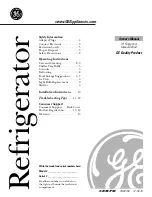
CLEANING
Ensure the appliance is unplugged before cleaning.
• Clean the inside and the outside of the
appliance with a soft cloth and a solution of a
tablespoon of baking soda to one quart of water
or some mild detergent.
• Wash shelves in a mild detergent solution, then
dry and wipe with a soft cloth.
• It is important to keep the area clean where the
door seals against the cabinet. Clean this area
with a soapy cloth. Rinse with a damp cloth and
let dry.
Note:
Do not use cleaners containing ammonia or
alcohol on the appliance. Ammonia or alcohol can
damage the appearance of the appliance. Never
use any commercial or abrasive cleaners or sharp
objects on any part of the appliance.
POWER FAILURE
Most power failures are corrected within a few
hours and should not affect the internal temperature
of the appliance if the number of times the door is
opened is kept to a minimum.
If power is lost, the appliance will keep all settings
in its memory and will resume normal functioning
automatically when power is restored.
Note:
Wait 3 to 5 minutes before attempting
to restart the refrigerator if operation has been
interrupted.
DEFROST
This appliance is equipped with an automatic
defrost function and does not require manual
defrosting. Defrost water from the appliance is
channeled into a drip tray located above the
compressor. Heat transfer from the compressor
causes the defrost water to evaporate.
6
CARE & MAINTENANCE
VACATION
• Short
vacations:
Leave the appliance operating
during vacations of less than three weeks.
• Long
vacations:
If the appliance will not be used
for several months, remove all items and turn
off the appliance. Clean and dry the interior
thoroughly. To prevent odor and mold growth,
leave the door open slightly, blocking it open if
necessary.
MOVING
• Remove all contents.
• Secure all shelves and the door with tape.
• Turn the adjustable leg up to the base.
• If the appliance is placed on its back or side
during transportation, upon reaching the
destination, allow it to remain upright for 6
hours before plugging in to avoid damage to
internal components.
DISPOSAL
This appliance may not be treated as regular
household waste, it should be taken to the
appropriate waste collection point for recycling
of electrical components. For information on local
waste collection points, contact your local waste
removal agency or government offi ce.








































